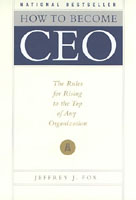 |
| ||||||||||||||||
 |
How To Become CEO : The Rules for Rising to the Top of Any Organization |
|||||||||||||||||||||
 |
Retail Price: LS Price: $11.53 You Save: $5.42 (32%) Availability: Usually ships within 24 hours Format: Hardcover, 162pp. ISBN: 9780786864379 Publisher: Hyperion Pub. Date: October 1998 Average Customer Review: |
Secure Order Guarantee Item No: 9780786864379 |
Excerpt from How To Become CEO : The Rules for Rising to the Top of Any Organization
I
Always Take the Job That Offers the Most Money
After you have decided what you want to do--whether it is banking, advertising, manufacturing, or something else--go to work for the company that offers you the most money. If you have not decided what kind of career or industry is for you, then take the job that offers the most money. If you are in a corporation, always take the transfer, promotion, or assignment that pays the most money.
There are several important reasons why you go for the money. First, all of your benefits, perquisites, bonuses, and subsequent raises will be based on your salary. Corporations give all extra compensation in percentages. Therefore, a 10 percent raise on a $22,000 salary is $200 better than the same raise on a $20,000 salary.
Second, the higher paid you are, the more visible to top management you will be.
Third, the more money you are paid, the more contribution will be expected of you. This means you will be given more responsibility, tasks, and problems to solve. And a chance to perform is an invitation to success.
Fourth, if two people are candidates for a promotion to a job that pays $50,000, and one person makes $30,000 and the other $40,000 the higher paid person always gets the job. The higher paid person gets the job regardless of talent, contribution, or anything else. Corporations usually take the easy way out, and it is easier to promote the higher paid than the lower.*
Finally, in business, money is the scoreboard. The more you make, the better you're doing. Simple.
*Promoting the higher paid is the path of no resistance in most organizations. Someone approved the higher paid person's compensation. Others concurred. To leapfrog the higher paid diminishes the sponsor of the higher paid. And the sponsors of the higher paid are, themselves, even higher paid. Promoting the higher paid endorses the wisdom of upper management.
![]()
VI
Do Something Hard and Lonely
Regularly practice something Spartan and individualistic. Do something that you know very few other people are willing to do. This will give you a feeling of toughness, a certain self-elitism. It will mentally prepare you for the battle of business.
Something that is hard and lonely is studying late at night for a graduate degree in fashion design, especially in the winter, when everyone else is asleep. Or running long, slow distances early in the morning (versus jogging at lunchtime with a mob).
Split wood, write, work in the garden, read King Lear, but does it by yourself. Do something that is solitary.
All great and successful athletes remember the endless hours of seemingly unrewarded toil. So do corporate presidents.
![]()
XII
Skip All Office Parties
There is no such thing as a business or "office party."' It is not a social gathering. It is business. Never party at an office party. It won't hurt you not to go at all. Don't offend people by criticizing the party or by publicly announcing your intentions. Simply don't go. Give polite excuses.
Never ever go to a company picnic if you cannot bring your spouse. A company picnic without spouses is trouble. To go is to run the risk of being tarred with the bad brush of others' actions.
If the unwritten rule is "you must attend or you will offend"' then go. Drink only soda. Stay no more than forty-five minutes. Thank the boss for inviting you, and leave. If anyone asks where you are going, tell that person you are meeting your spouse, or parents, or fiancée, or doctor, or music teacher, or personal trainer.
Parties are supposed to be fun, enjoyed with friends. Heed the old axiom: "Don't mix business with pleasure.'''
![]()
XVIII
Arrive Forty Five Minutes Early and Leave Fifteen Minutes Late
If you are going to be first in your corporation, start practicing by being first on the job. People who arrive at work late don't like their jobs at least that's what senior management thinks. People don't arrive twelve minutes late for the movies. And being early always gives you a psychological edge over the others in your company.
Don't stay at the office until ten o'clock every night. You are sending a signal that you can't keep up or that your personal life is poor. Leave fifteen minutes late instead. In those fifteen minutes organize your next day and clean your desk. You will be leaving after 95 percent of the employees any way, so your reputation as a hard worker stays intact.
There are too many times in your career when circumstances such as airline schedules and sales meetings and yearend closings and such will keep you away from home until late. Give more time to your family.
Plus forty-five minutes early and fifteen minutes late is an hour a day. That's two hundred fifty hours a year or 31 days. You can get ahead quickly working one extra month a year.
|
All prices subject to change and given in U.S. Dollars. |
All materials contained in http://www.LeadershipNow.com are protected by copyright and trademark laws and may not be used for any purpose whatsoever other than private, non-commercial viewing purposes. Derivative works and other unauthorized copying or use of stills, video footage, text or graphics is expressly prohibited. LeadershipNow is a trademark of M2 Communications, LLC. |